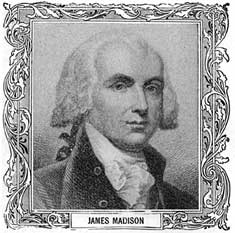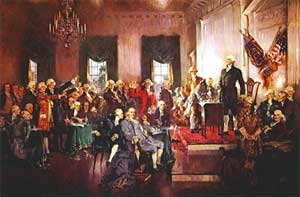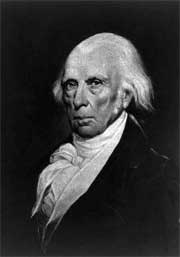| James Madison was elected the fourth President of the United States (1809-17). Known as the "Father of the Constitution," he was the last of the founding fathers to serve as President.

Madison was born in Port Conway, Virginia, to a wealthy family and grew up at their estate called Montpelier. He graduated from the College of New Jersey (now Princeton University) in 1771. In 1776, Madison was elected to the Virginia Convention. His role was to assist in writing the Virginia State Constitution.

 From 1777 to 1780, he was a member of the Governor's Council, where his lifelong friendship with Thomas Jefferson began. He was then elected to the Continental Congress, where, as its youngest member, he served from 1780 to 1783. He quickly rose to a position of leadership and helped to write the "Articles of Confederation." He became friends with Alexander Hamilton, despite the fact that Hamilton was a political opponent of his other good friend, Thomas Jefferson. Hamilton and Madison both agreed that there was a need for a strong central government. From 1777 to 1780, he was a member of the Governor's Council, where his lifelong friendship with Thomas Jefferson began. He was then elected to the Continental Congress, where, as its youngest member, he served from 1780 to 1783. He quickly rose to a position of leadership and helped to write the "Articles of Confederation." He became friends with Alexander Hamilton, despite the fact that Hamilton was a political opponent of his other good friend, Thomas Jefferson. Hamilton and Madison both agreed that there was a need for a strong central government.
In 1786, Madison was appointed a delegate to the Annapolis Convention, which was called to discuss interstate commerce. Few attended, but Madison drew the favorable attention of George Washington. Madison became a delegate to the Constitutional Convention in Philadelphia where, again, he was one of the youngest delegates in attendance. During the meetings he kept a diary of the debates over the drafted plans. When all was said and done, it was Madison's "Virginia Plan" that became the basis for the US Constitution. This plan was to form a government in which the people would elect representatives to a Congress that would propose, debate, and pass laws for the country. His final draft was passed in September of 1787.
Along with Hamilton and John Jay, Madison wrote a series of essays known as the Federalist Papers, which laid out the government in terms that the common people would understand. Simply stated, it was devoted to the principles of religious and intellectual freedom eventually included in the Bill of Rights. This document also included an explanation of the system of checks and balances that divided power between the central government and the individual states. At the urging of George Washington, Madison became involved in the Virginia State legislature and lobbied strenuously and successfully for acceptance of the Constitution, in spite of the opposition of Patrick Henry.
 James Madison's greatest contribution was his original draft of what eventually became the Constitution of the United States. This is his permanent mark on history. Once the Constitution was in place, Madison went on to serve his country in other ways. He was Secretary of State under Thomas Jefferson, completing the Louisiana Purchase, which James Monroe had negotiated and enabled the United States to expand west in one large stroke of a pen. Madison was also responsible for the executive veto and the federal government's ability to override state laws. James Madison's greatest contribution was his original draft of what eventually became the Constitution of the United States. This is his permanent mark on history. Once the Constitution was in place, Madison went on to serve his country in other ways. He was Secretary of State under Thomas Jefferson, completing the Louisiana Purchase, which James Monroe had negotiated and enabled the United States to expand west in one large stroke of a pen. Madison was also responsible for the executive veto and the federal government's ability to override state laws.

Madison was not above reproach, however. As President, his foreign policies were criticized. He asked Congress to declare war against Great Britain, initiating the War of 1812. It was an unpopular and unsuccessful conflict fought over shipping rights, which ended in a stalemate. During the war, the British invaded Washington DC, and the President and Congress were forced to flee. The British burned both the city and the White House.

 In 1817, Madison retired to his Montpelier plantation with his wife Dolly, who is especially remembered for her charm as a hostess during his presidency. He avoided party politics, but later became a member of the Virginia Constitutional Convention of 1829. He supported President Andrew Jackson in 1832 and helped Jefferson start the University of Virginia, becoming its President in 1826. Before he died Madison wrote "Advice to My Country", which was an endless succession of letters and articles. This prompted Henry Clay, a great orator in Congress, to say that after Washington, Madison was our greatest statesman. After years of various illnesses Madison died at Montpelier estate on June 28, 1836. In 1817, Madison retired to his Montpelier plantation with his wife Dolly, who is especially remembered for her charm as a hostess during his presidency. He avoided party politics, but later became a member of the Virginia Constitutional Convention of 1829. He supported President Andrew Jackson in 1832 and helped Jefferson start the University of Virginia, becoming its President in 1826. Before he died Madison wrote "Advice to My Country", which was an endless succession of letters and articles. This prompted Henry Clay, a great orator in Congress, to say that after Washington, Madison was our greatest statesman. After years of various illnesses Madison died at Montpelier estate on June 28, 1836.
|

